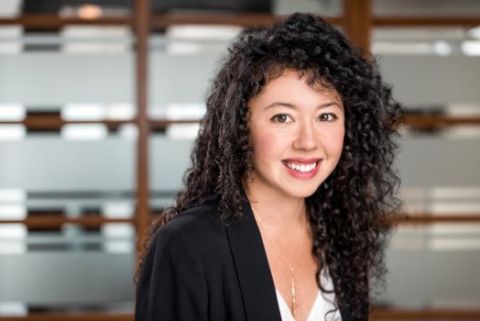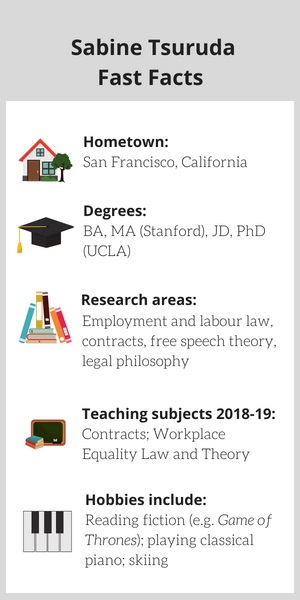
This Q&A is part of a series featuring faculty members joining Queen’s Law this summer. 2018 is a banner year for faculty hires, with the addition of seven new professors to the school’s roster of exceptional scholars. All of these new talented researchers have already earned international recognition in their fields.
Upon arriving in Kingston, Professor Sabine Tsuruda spoke with Queen’s Law Reports to share her professional and personal interests.
Why did you decide to join Queen’s Law?
I was drawn to Queen’s Law because of its strengths in workplace law and legal philosophy. As a legal philosopher who writes on workers’ rights, Queen’s Law presented a unique opportunity to bring these subjects together in my teaching and research, and to join others with similar interests in the Centre for Law in the Contemporary Workplace and the Colloquium in Legal and Political Philosophy. During my visit, I was also impressed by the innovative and high-energy faculty, staff, and students. I came away feeling this was something I really wanted to be a part of.
What got you interested in your area of law?
As an undergraduate, I was initially drawn to philosophy out of an interest in two big questions: what is it to live well and how would a society have to be organized to be just. Over the course of my studies and through the experiences of friends and family, I became increasingly interested in labour and employment law because of the influence of our jobs and the labour market over our social statuses and prospects for leading meaningful lives according to our own lights. Where we work and with whom, how much we make, what kinds of things we do as our work, and what our workplace relations are like can shape not just what we can purchase but also whether and when we have children, support this or that political party, and a variety of other facets of our lives in and outside of the workplace. And legal regulation of work plays a huge role in setting the tone and content of many life-shaping workplace relations and rules. My interest in labour and employment law has thus grown out of my interests in ethics and social justice.

Tell us about your research.
We often think about workplace inequalities in terms of differences in working conditions along lines of protected statuses, such as gender and race, and differences in economic power. My research aims to complement that analysis by examining how burdens and restrictions on employees’ speech and associational freedoms can also constitute wrongful workplace inequality. Of course, burdens and restrictions on speech and association often coincide with (or are effectuated by) economic, racial, and other social status inequality. But I think we can enrich our understanding of these dimensions of inequality by investigating what moral values explain workers’ interests in speech (such as critical speech about the workplace) and association (economic, intimate, and political alike). For instance, a full explanation of the wrong of gender discrimination in the workplace might include a discussion of the moral significance of deferential speech patterns. Similarly, an exploration of whether certain guest worker programs are forms of national origin discrimination might attend not only to the material working conditions on the ground, but also to structural and legal barriers to guest workers maintaining familial and political ties.
What are you most proud of?
Much of what I’ve done is due to the love, support, and collective efforts of many wonderful people (friends, family, advisors, colleagues). One project for which I received a tremendous amount of help is completing the Joint JD/PhD Program in Law and Philosophy at UCLA. I’m perhaps most proud of my JD/PhD because of the many relationships I’ve formed in the course of completing the program and its significance for my family – I’m the first to receive a graduate degree.
Any hobbies or interests?
In another life, I would have loved to have been a novelist! I enjoy reading all kinds of fiction, ranging from fantasy (e.g., Game of Thrones) to 19th century British literature and Haruki Murakami’s surrealist writing. I also grew up playing classical piano, and I try to practice and learn a new piece when I can. I enjoy cross-country and downhill skiing, and am looking forward to discovering places in the region to do that come winter and early spring.